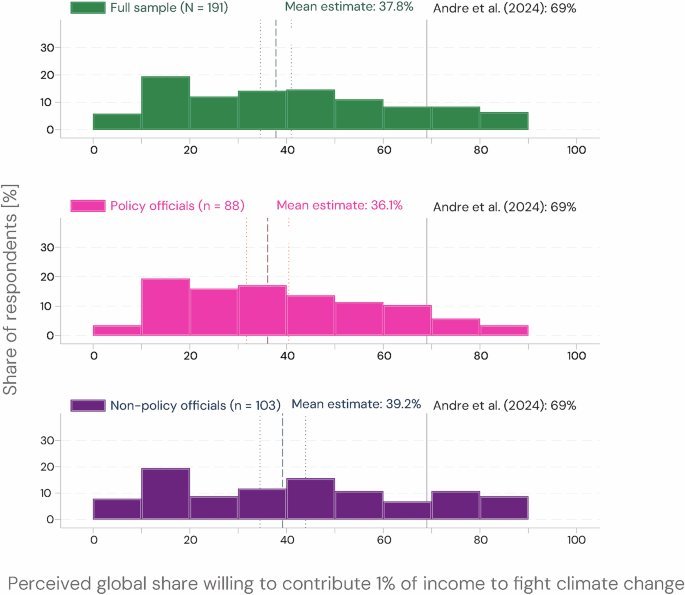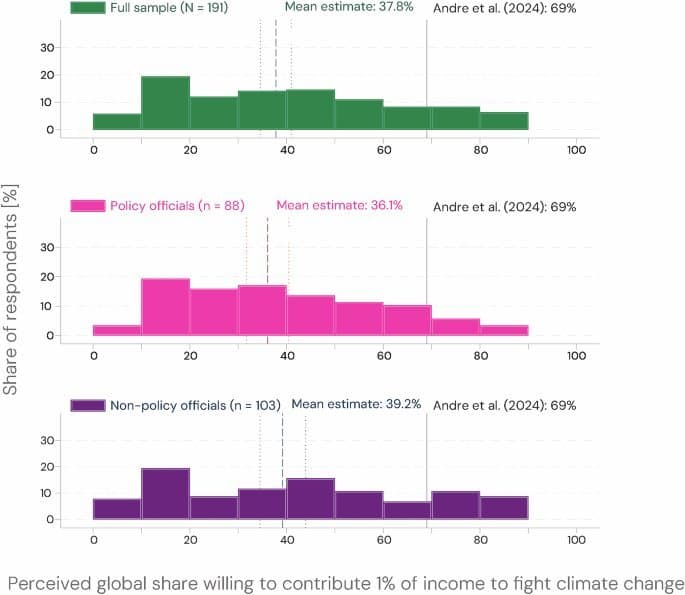Attendees at the UN Environment Assembly vastly underestimate global willingness to fund climate action, with officials perceiving only 37% support versus the actual 69%. This gap in understanding could hinder ambitious climate policies crucial for driving green tech innovation and sustainable infrastructure.
A startling disconnect exists between global climate policymakers’ perceptions of public sentiment and reality, reveals a study of 191 attendees at the 2024 UN Environment Assembly (UNEA-6). Published in Communications Earth & Environment, the research found that delegates—including government negotiators, UN officials, and advisors—estimated only 37.8% of the global public would contribute 1% of their income toward climate action. In reality, a benchmark survey of 125 countries shows 69% express this willingness.

Graph showing the significant gap between perceived (37%) and actual (69%) public support for climate funding among UNEA-6 attendees.
Why This Matters for Tech and Innovation
This perception gap isn’t just a social curiosity—it has tangible implications for the pace and ambition of climate technology development:
- Policy Ambition Shapes Markets: Weaker perceived public mandate may lead to less aggressive emissions regulations, carbon pricing, or green investment frameworks—key drivers for scaling renewable energy, carbon capture, and sustainable infrastructure tech.
- Investment Signals: Tech investors and startups rely on policy certainty. Underestimating public support could stifle commitments to high-risk, high-reward climate R&D.
- Implementation Barriers: Public buy-in is critical for deploying contentious technologies like grid-scale battery storage or nuclear innovation. Misreading support risks misallocating resources.
The Puzzling Consistency of the Gap
Notably, the misperception persisted across roles:
- Policy officials (national delegates, UN staff): 36.1% estimated support
- Non-policy attendees (NGOs, academia, private sector): 39.2%
Even more surprising? Delegates were highly climate-concerned (88% “very” or “extremely worried”) and knowledgeable about emissions sources. Yet, like the general public, they fell prey to “pluralistic ignorance”—the false belief one’s views are uncommon.
Unlocking Bolder Climate Tech Futures
Correcting this gap could accelerate action:
“Seeking to inform policy officials about current public opinion on climate change could be a worthwhile objective. Prior research shows providing policymakers with opinion data can affect political speech, opinions, and decisions.”
For the tech sector, this underscores the need to:
- Advocate with Data: Share evidence of public support (e.g., adoption rates for EVs, solar) with policymakers.
- Build Coalitions: Align startups, investors, and civil society to demonstrate demand for policy ambition.
- Design for Participation: Embed public engagement tools in climate tech deployment to reinforce social license.
The study highlights a critical blind spot: those steering global climate policy may have far stronger public backing for bold action—and the tech transformation it requires—than they realize. Closing this perception gap could become a catalyst for the systemic innovation our planet demands.
Source: Fang et al. (2025), Communications Earth & Environment

Comments
Please log in or register to join the discussion